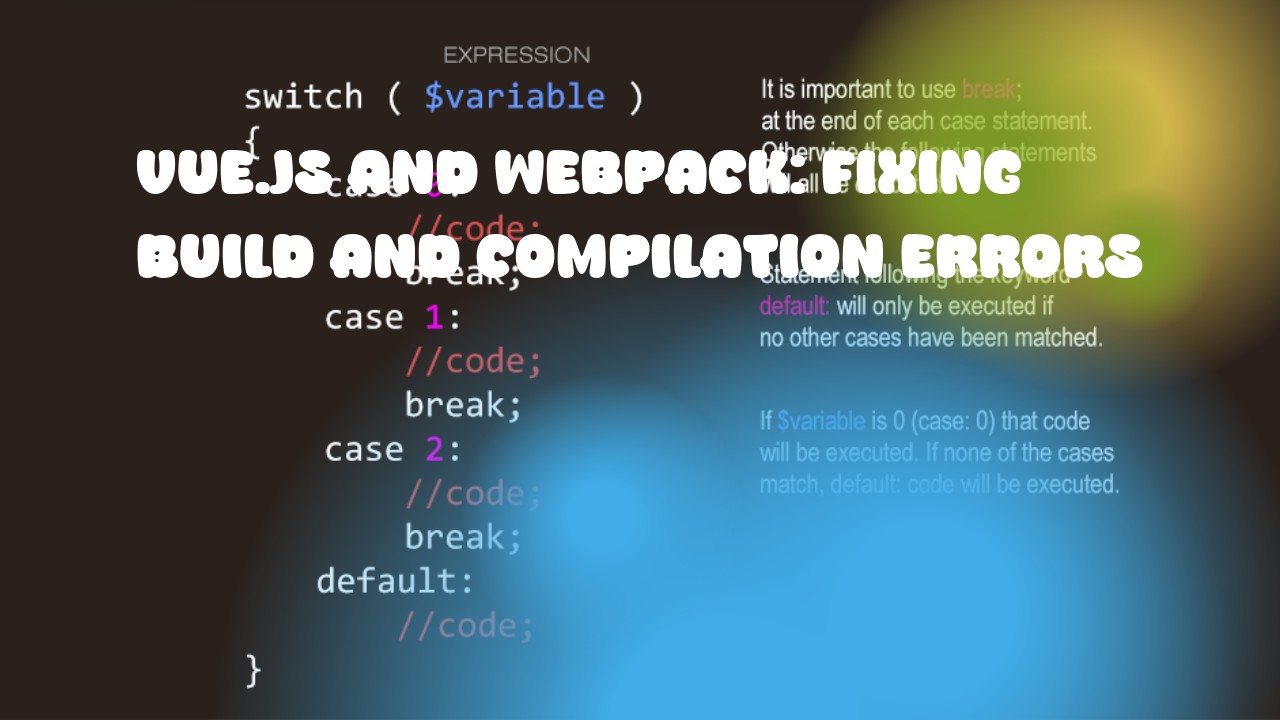In Vue.js, especially when using Webpack for building your project, you might face several build or compilation errors. Below are some common issues and their solutions to resolve these errors:
1. Module Not Found Error
If a module can't be found during the build process, it could be due to wrong import paths or uninstalled dependencies. Here is how you fix it:
- Check your
importstatements in your Vue components and ensure that they are correctly referencing your installed npm modules.// Before (wrong) import Vue from 'vue/dist/vue.js'; // After (correct) import Vue from 'vue'; - If you recently added a new dependency, make sure it's properly installed by running
npm installoryarn.
2. Webpack Configuration Errors
Ensure your webpack configuration file (usually webpack.config.js) is correctly set up. Common issues include incorrect loaders, plugins, and missing configurations. Check if the loaders you're using are installed correctly and their correct version.
3. Syntax Errors
Vue files contain JavaScript syntax, so make sure that your linting tool (like ESLint) doesn't throw errors in Vue files. You can ignore specific rules for Vue files if needed.
4. Webpack Dev Server Configuration
If you are using the webpack-dev-server, ensure it is correctly configured to handle hot module replacement (HMR). Check webpack.config.js:
const config = {
// ...
devServer: {
hot: true,
contentBase: './dist',
},
};
module.exports = config;
5. Webpack Missing Variable
If you're using webpack's plugins or loaders and run into an error like "Cannot read property 'hot' of undefined", it might be because the plugin isn't properly installed or configured. Double-check your webpack.config.js and make sure the plugin is included with its correct options.
6. CSS Import Errors
If you are importing CSS files in your Vue components but they do not work, check if webpack is correctly processing and bundling them. Make sure to use the appropriate loaders for CSS (e.g., css-loader, style-loader), and ensure that your CSS files have valid URLs or absolute paths.
7. Clean Webpack Plugin
If you're using Vue CLI, check if the vue-cli-plugin-pwa is correctly installed and its configuration in vue.config.js doesn't cause issues with your CSS files.
8. File Loader Error
Ensure that the file loader (file-loader) or url-loader is correctly configured to handle static assets like images, fonts, etc. You can update your webpack config file accordingly:
module: {
rules: [
{
test: /\.(png|jpe?g|gif)$/i,
use: [
{
loader: 'file-loader',
options: {
name: '[path][name].[ext]',
},
},
],
},
],
},
9. Missing Babel Configuration
If your project uses ES6+ features not supported by older browsers, make sure you have a Babel configuration in place that targets the browser(s) you want to support. You can create a .babelrc file or update your webpack.config.js to include babel-loader:
{
module: {
rules: [
// ...
{
test: /\.(js|vue)$/,
exclude: /node_modules/,
use: ['babel-loader']
},
// ...
]
}
}
10. Webpack HMR Error
If you're getting a "Cannot find module 'webpack/hot/dev-server'" error, it might be related to the webpack-dev-server version compatibility with your current Vue setup. Make sure you have the correct versions of these packages.
Remember, debugging webpack builds can be complex. When faced with errors, try to analyze the error message and look for potential issues within your project structure, dependencies, or configurations.

